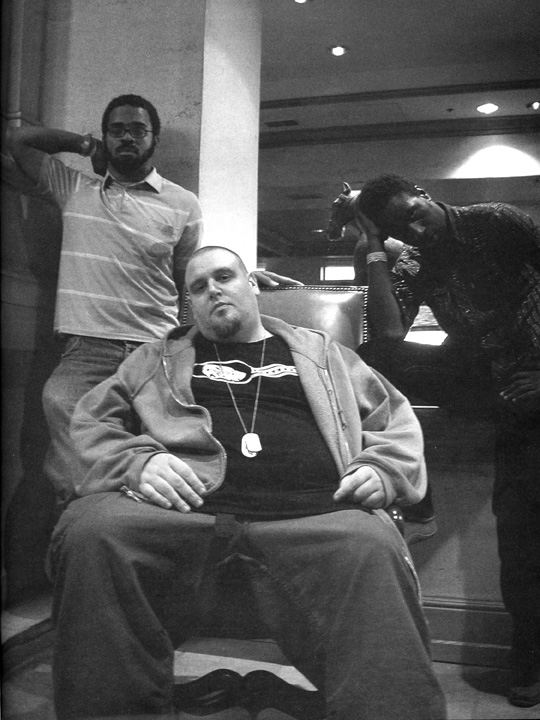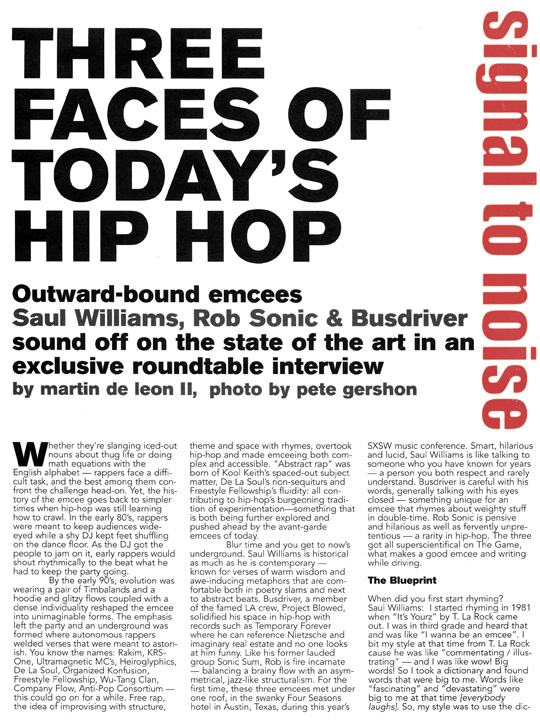
THREE FACES OF TODAY'S HIP HOP
OUTWARD-BOUND EMCEES SAUL WILLIAMS, ROB SONIC & BUSDRIVER SOUND OFF ON THE STATE OF THE ART IN AN EXCLUSIVE ROUNDTABLE INTERVIEW
Whether they're slanging iced-out nouns about thug life or doing math equations with the English alphabet - rappers face a difficult task, and the best among them confront the challenge head-on. Yet, the history of the emcee goes back to simpler times when hip-hop was still learning how to crawl. In the early 80's, rappers were meant to keep audiences wide-eyed while a shy DJ kept feet shuffling on the dance floor. As the DJ got the people to jam on it, early rappers would shout rhythmically to the beat what he had to keep the party going.
By the early 90's, evolution was wearing a pair of Timberlands and a hoodie and glitzy flows coupled with a dense individuality reshaped the emcee into unimaginable forms. The emphasis left the party and an underground was formed where autonomous rappers welded verses that were mean to astonish. You know the names: Rakim, KRS-One, Ultramagnetic MC's, Hieroglyphics, De La Soul, Organized Konfusion, Freestyle Fellowship, Wu-Tang Clan, Company Flow, Anti-Pop Consortium - this could go on for a while. Free rap, the idea of improvising with structure, theme and space with rhymes, overtook hip-hop and made emceeing both complex and accessible. "Abstract rap" was born of Kool Keith's spaced-out subject matter, De La Soul's non-sequiturs and Freestyle Fellowship's fluidity: all contributing to hip-hop's burgeoning tradition of experimentation - something that is being further explored and pushed ahead by the avant-garde emcees of today.
Blur time and you get to now's underground. Saul Williams is historical as much as he is contemporary - known for verses of warm wisdom and awe-inducing metaphors that are comfortable both in poetry slams and next to abstract beats. Busdriver, a member of the famed LA crew, Project Blowed, solidified his place in hip-hop with records such as Temporary Forever where he can reference Nietzsche and imaginary real estate and no one looks at him funny. Like his former lauded group Sonic Sum, Rob is fire incarnate - balancing a brainy flow with an asymmetrical, jazz-like structuralism. For the first time, these three emcees met under one roof, in the swanky Four Seasons hotel in Austin, Texas, during this year's SXSW music conference. Smart, hilarious and lucid, Saul Williams is like talking to someone who you have know for years - a person you both respect and rarely understand. Busdriver is careful with his words, generally talking with his eyes closed - something unique for an emcee that rhymes about weighty stuff in double-time. Rob Sonic is pensive and hilarious as well as fervently unpretentious - a rarity in hip-hop. The three got all superscientifical on The Game, what makes a good emcee and writing while driving.
The Blueprint
When did you first start rhyming?
Saul Williams: I started rhyming in 1981 when "It's Yourz" by T. La Rock came out. I was in third grade and heard that and was like "I wanna be an emcee." I bit my style at that time from T. La Rock cause he was like "commentating / illustrating" - and I was like wow! Big words! So I took a dictionary and found words that were big to me. Words like "fascinating" and "devastating" were big to me at the time [everybody laughs]. So, my style was to use the dictionary and find big words to use in my rhymes. T. La Rock was what got me started, then it was Run DMC and LL Cool J - those were the people that got me into hip-hop. Run DMC cause they were hard and LL cause he was young and I was younger than him, so I was like "well, yo, I'm gonna take him out!" All my first rap songs as a kid were battling LL, like, "I'm the youngest!" [everybody laughs]
Busdriver: I actually picked up right where Saul left off - LL, Run DMC, even the Fat Boys - that whole era. Mainly having to do with the fact that my dad had something to do with that film, Krush Groove. So, yeah, I got to meet them and I was like "wow!" - it took on a life of its own.
Saul Williams: I can hear the Fat Boys influence in your sound. [everybody laughs]
Rob Sonic: I started when I was 11 or 12 - for real, cause I got into the music from other sources, breaking was how I got introduced into it and I just wasn't that fresh. So, they were like "well, you need to hold the radio, you need to do something else, cause you're getting us creamed" [everybody starts laughing]. I guess when I actually started rhyming was when cats started battling for money during lunch, then that sprawled off to rapping at assemblies at middle school. And it just took off from there; I guess I was just good at it.
As both rapper and fans of hip-hop, what do you think of today's emcees?
Saul Williams: There's people in the game. Not only on this side. For instance, I actually like the Game. There's a balance of rawness, introspection - which is really important - that's usually what's missing from a commercial emcee is that they take on a persona of being so hard that they don't feel, they're invulnerable. That's usually what bores me. I'm actually listening to some commercial shit right now.
Rob Sonic: I was going to say; I don't think there is much of a disparity as times before, because at our age we've seen hip-hop at all its stages and sometimes at it's ugliest. And I don't really think that's happening right now. It started out with Biggie and cats like that, who are really good emcees, cats like Jay-Z and Nas, you got cats in the game who are nice. I mean, you are not always going to get a hundred percent, utopian thing but I think there's a good balance on all levels.
Busdriver: I think the quality of production on the larger-scale stuff is really what's drawing me in, because they are stripping it down and yet upping the quality of the pieces that they are doing. I like the Game, too. I'm really into him mainly because of his vernacular, he's very regional and specific and I can identify with that being from Los Angeles.
Saul Williams: He sounds like he's from New York to me where 50 on the other hand sounds like he's from Cali or the South.
Busdriver: I think they genetically altered him when he got signed because his whole physique completely morphed. He got taller and it seemed like they carved him out of stone. But, I like what they did with him. You got to see a no-name, unsigned rapper turn into the megastar and be transformed in many different ways.
Microphone Mathematics
What are the fundamentals? What make a good emcee?
Saul Williams: I don't know what the fundamentals are - I'm still learning them. Recently, I've been more concerned trying to figure out - I used to be on this whole bandwagon of "yo, every emcee is a poet!" I remember KRS-One supplied the album that I could present to my parents and be like "See! See!" and he was like "I am a poet." And recently I was on this thing like what is the distinction between an emcee and a poet? And what I've come up with is that first of all, emceeing is a game - it's competitive, it's a sport. So, that an emcee has to take on the hip-hop slogan, if you will, "act like you know," an emcee has to act like they know - must show no signs of vulnerability so it seems. And to me, the poet on the other hand, their power is in expressing their vulnerability. The emcee seems to find their power, in my opinion, when they take on more of the poet's stance. Even if you are looking at 8 Mile and that whole scene where Eminem wins the battle. To me, when he expressed his vulnerability, when he's like, "go ahead, say it, I'm white" - when he expressed his vulnerability within the context of being an emcee - that made his shit more powerful. To me, that's the real power of emceeing is in finding the balance between saying "keep it real" and actually being real and allowing your real persona to shine through. But yeah, I think it's a balance between introspection, braggadocio, hardness, softness, and fluidity, all of this.
Busdriver: I think what I try to deal with is the common thread that the kind of rapping I do, the common thread between that and the other genres that I'm into like punk or rock or jazz. So, I try to link those with a style that compliments those. Because I think hip-hop is a culmination of all of these American musics. But, the fundamentals of a rapper - the whole party thing, party rhyming, that's still there. There's also this whole other thing that people don't appreciate as much of, ciphering. I think circle rapping has really molded the underground rapping of the past 10 years. Even though things have strayed away from being on the verse - it's more about songs now - but back in the early nineties it was about the verse. Like, "did you hear that verse El-P kicked? He killed it!" I think that's one of the ground zeroes, one of the important things of underground rap.
Rob Sonic: I think it's subjective, to be honest. Being 30 plus, rhyming as long as I've been rhyming, I've seen the fundamentals take on different shapes, different forms. At one point, it was really important to have routines - back in the day when Cold Crush and Funky Four plus One More came out. I think the one fundamental that's always held true is originality - don't bite. And to be serious about the craft cause unfortunately you have a lot of people who are like "that's easy" - and that's a fucked up mentality.
Saul Williams: The thing is though, I get confused sometimes, cause the dopest emcees make it sound easy. It looks so simple.
Rob Sonic: Right, but it takes a lot, fluidity is a hard thing to pull off but when you can do it, it's a thing of beauty. But that's what it is and it comes from experience, really taking it seriously, really putting your heart into it - and that's the thing I really get bitter about cause you still have people like "well, you can't play a guitar so you're not really doing it" but it's like nah, the voice is the main vehicle…it's just like any other thing and it can be as classic as anything else done in music.
Saul Williams: If you think about it as mothafuckas gather around to hear these cats speak, that's the eldest tradition of artistic expression known to human kind. And the oral tradition is older than the written one. So it's intense, it's an amazing thing.
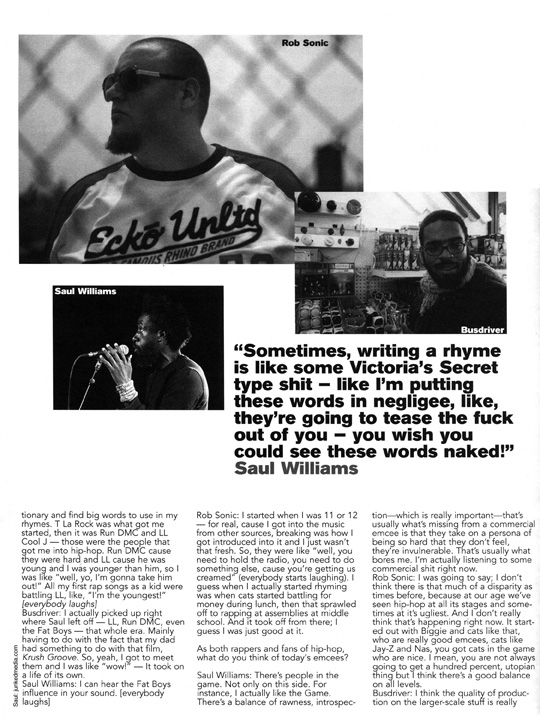
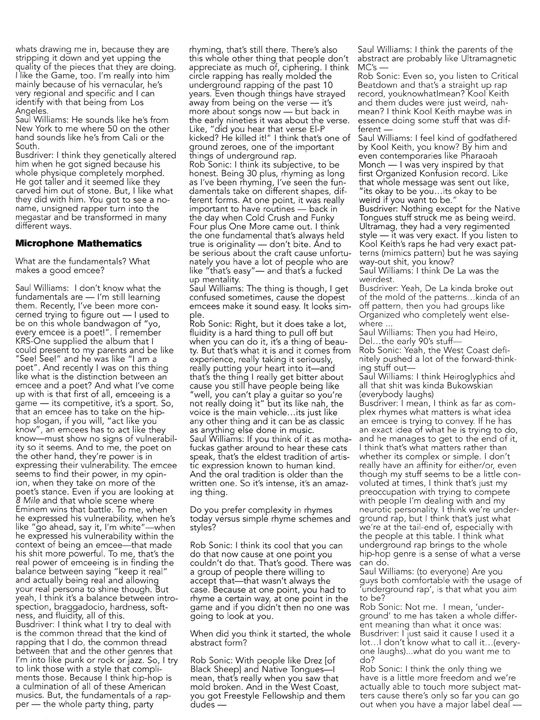
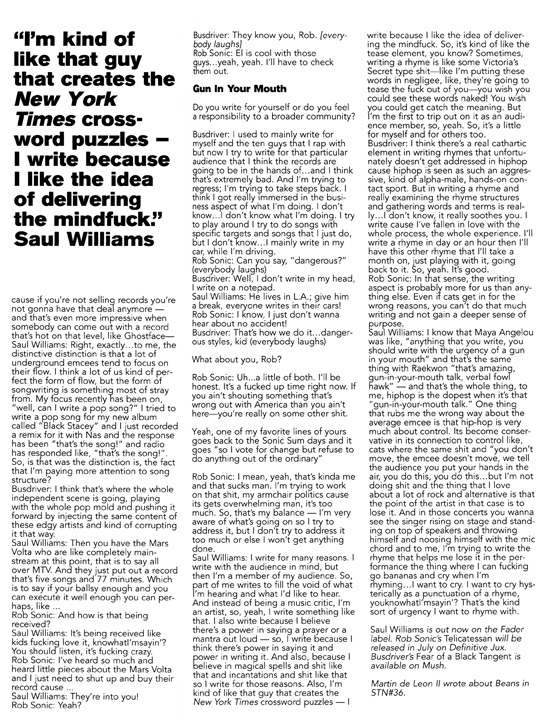
Do you prefer complexity in rhymes today versus simple rhyme schemes and styles?
Rob Sonic: I think it's cool that you can do that now cause at one point you couldn't do that. That's good. There was a group of people there willing to accept that - that wasn't always the case. Because at one point, you had to rhyme a certain way, at one point in the game and if you didn't no one was going to look at you.
When did you think it started, the whole abstract form?
Rob Sonic: With people like Drez [of Black Sheep] and Native Tongues - I mean, that's really when you saw that mold broken. And in the West Coast, you got Freestyle Fellowship and them dudes.
Saul Williams: I think the parents of the abstract are probably like Ultramagnetic MC's.
Rob Sonic: Even so, you listen to Critical Beatdown and that's a straight up rap record, youknowhatImean? Kool Keith and them dudes were just weird, nah mean? I think Kool Keith maybe was in essence doing some stuff that was different.
Saul Williams: I feel kind of godfathered by Kool Keith, you know? By him and even contemporaries like Pharaoh Monch - I was very inspired by that first Organized Konfusion record. Like that whole message was sent out like, "it's okay to be you…it's okay to be weird if you want to be."
Busdriver: Nothing except for the Native Tongues stuff struck me as being weird. Ultramag, they had a very regimented style - it was very exact. If you listen to Kool Keith's raps he had very exact patterns (mimics pattern) but he was saying way-out shit, you know?
Saul Williams: I think De La was the weirdest.
Busdriver: Yeah, De La kinda broke out of the mold of the patterns…kinda of an off pattern, then you had groups like Organized who completely went elsewhere…
Saul Williams: Then you had Hiero, Del…the early 90's stuff.
Rob Sonic: Yeah, the West Coast definitely pushed a lot of forward-thinking stuff out.
Saul Williams: I think Hieroglyphics and all that shit was kinda Bukowskian [everybody laughs].
Busdriver: I mean, I think as far as complex rhymes what matters is what idea an emcee is trying to convey. If he has an exact idea of what he is trying to do, and he manages to get to the end of it, I think that's what matters rather than whether it's complex or simple. I don't really have an affinity for either / or, even though my stuff seems to be a little convoluted at times, I think that's just my preoccupation with trying to compete with people I'm dealing with and my neurotic personality. I think we're underground rap, but I think that's just what we're at the tail-end of, especially with the people at this table. I think what underground rap brings to the whole hip-hop genre is a sense of what a verse can do.
Saul Williams: (to everyone) Are you guys both comfortable with the usage of 'underground rap', is that what you aim to be?
Rob Sonic: Not me. I mean 'underground' to me has taken a whole different meaning than what it once was.
Busdriver: I just said it cause I used it a lot…I don't know what to call it…what do you want me to do?
Rob Sonic: I think the only thing we have is a little more freedom and we're actually able to touch more subject matters cause there's only so far you can go out when you have a major label deal.
MARTIN DE LEON II
